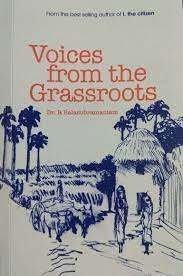Book Review by Ms. Seena Mary Thankachan, Policy Research Associate, PIC
Voices from the Grassroots by Dr. R Balasubramaniam is a poignant and thought-provoking exploration of the intricate tapestry of Indian society, woven with threads of economic, societal, and spiritual dimensions. The book’s enduring relevance lies in its ability to capture the pulse of the common people, shedding light on the stark disparities between the so-called “qualified” and the disadvantaged in the remote corners of the Indian subcontinent.
A respected development activist, leadership trainer, thinker and writer of the best-selling book i, the citizen, Dr. Balasubramaniam has studied and taught at the world’s leading schools of policy and development including Harvard and Cornell. He was special investigator for Lokayukta Karnataka and has held consulting positions in government bodies and commissions, the World Bank, and academic boards and development agencies. He is also the founder of Swami Vivekananda Youth Movement and Grassroots Research And Advocacy Movement (GRAAM).
The author’s journey in the book is marked by a meeting with a tribal girl in late December 1987 and serves as a powerful catalyst for unravelling the paradoxes inherent in the lives of the so-called “qualified” individuals and the economically disadvantaged. Dr. Balasubramaniam eloquently glorifies the “qualified” nature of the poor, encapsulating it in the evocative phrase “Being rich while staying poor.” The narrative unearths the irony embedded in the policy frameworks of the Indian government, which, despite years of existence, often remain silent in implementation.
The book questions the very essence of development after colonial rule, emphasising the skewed focus on technological advancement in megacities at the expense of the neglected remote areas. The author highlights the stark disparities in accessibility to hospitals and educational institutions, raising crucial concerns about the efficacy of post-colonial rehabilitation.
The chapters delve into the importance of context-specific education, advocating for creative life skill formation for children in challenging circumstances. The book contends that sustainable development in tribal and remote regions necessitates a departure from top-down decision-making processes, urging the inclusion of full-time consultations from the locals. The author criticises the “non-urban ignorance” and the lack of native wisdom in policy formulation, asserting that the participation of locals is imperative for successful development programmes.
Dr. Balasubramaniam offers a critical analysis of Indian democracy, deeming it “noisy” and “unhealthy.” He calls out bureaucrats at the grassroots level for failing to recognise the transformative potential of democratising development. The author expresses skepticism about the effectiveness of major national democratic institutions like Lokpal and Lokayuktas, emphasising the need for qualified and accountable individuals to populate these bodies.
The book provocatively questions the disconcerting reality of India’s development, despite impressive economic growth. It challenges the prevailing narrative by pointing out that 54 percent of children are malnourished, rural women face anaemia, and a significant portion of the population lacks access to safe drinking water and sanitation facilities. Dr. Balasubramaniam urges a shift in focus from building statues and temples to bridging the development gaps and addressing pressing issues like hunger and poverty.
The author delves into the significance of self-help groups, initially community-driven but now marred by the influence of large-scale microfinance institutions. He emphasises the need for an effective approach that goes beyond monetary assistance, providing psychological, social, and political strength to individual members.
Throughout the narrative, the author weaves stories of individuals who, despite facing hardships, extend a helping hand to others. Dr. Balasubramaniam celebrates their acts of kindness, affirming that these people are not merely “playing it forward” but ensuring humanity’s continued existence.
The book critiques the intolerant nature of India on various fronts, questioning the acceptance of elite capture in public policies and the growing influence of crony capitalism. Dr. Balasubramaniam advocates for a shift from “greed-based” to “need-based” societies, echoing Mahatma Gandhi’s vision.
In the final chapters, the author contemplates the meaning of citizenship and emphasises citizen engagement as a complementary force to the state, crucial for overall development. He challenges the notion of “Swachh Bharat” being a mere slogan, urging citizens to actively engage in social accountability processes to ensure good governance.
Voices from the Grassroots is a compelling narrative that not only exposes the flaws in India’s development trajectory but also advocates for a paradigm shift in societal attitudes, governance, and policy implementation. Dr. Balasubramaniam’s eloquent storytelling and incisive analysis make this book a powerful call to action for readers to contemplate, engage, and actively contribute to shaping a more equitable and humane society.


888slot – Cơn lốc mới trên bản đồ giải trí trực tuyến 2025, hứa hẹn khuấy đảo cộng đồng cược thủ yêu thích sự đẳng cấp và đổi mới. Đây, là điểm đến lý tưởng cho người chơi tìm kiếm cơ hội làm giàu, là biểu tượng cho xu hướng cá cược thời đại mới. TONY01-06S